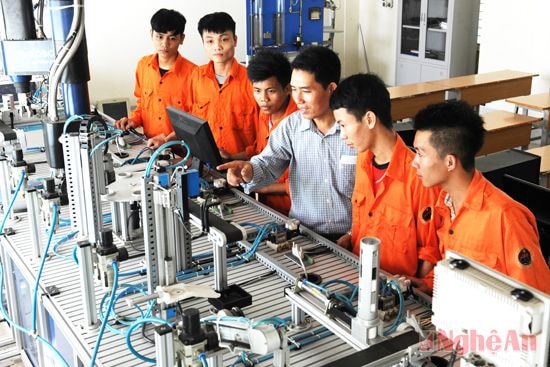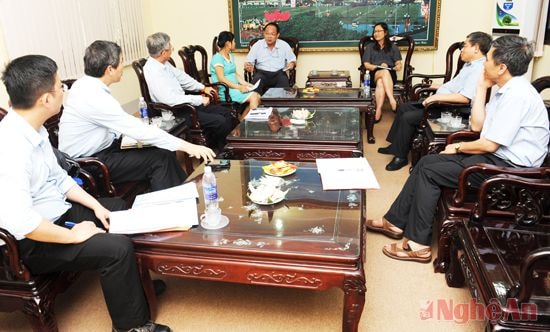Striving to become a national key school
(Baonghean) - Over the past 55 years, Vinh University of Technical Education (SPKT) has made strong progress, creating the premise to realize the goal of becoming a key national SPKT university. On the eve of the 25th Party Congress of the school, Nghe An Newspaper reporter had an interview with Dr. Hoang Thi Minh Phuong, Deputy Secretary of the Party Committee and Principal of the school.
 |
| Practice of automation subject of students of Electrical Engineering. |
Reporter:Doctor, what are the outstanding results that the school has achieved in recent times?
Dr. Hoang Thi Minh Phuong:During the past term, the Party Committee of Vinh University of Technology and Education has strived to overcome difficulties, unified leadership, direction and well organized the implementation of the Resolution of the Party Congress of the University, thus achieving many outstanding results.
Regarding training: The school continues to expand its scale and training fields, focusing on restructuring and improving training quality according to social needs. Currently, the school's training scale is about 8,000 students with 2 master's majors, 10 university majors, 12 college majors and 17 vocational college-level occupations. In particular, the school is invested in training international key vocational teachers (GVDN) for the following majors: Machine manufacturing technology, Automotive technology, Electrical - electronic engineering technology, Telecommunications electronics engineering technology; 5 key majors in the ASEAN region: Control and automation engineering, Mechanical engineering, Welding technology, Information technology, Refrigeration engineering technology; the rest are national key majors.
Most of the school's students, after graduating, find and create jobs with stable incomes. Many have become good managers, vocational teachers, and prestigious technical staff in vocational training institutions and businesses.
In 2014, Vinh University of Technical Education started training masters in 2 majors: Electrical Engineering and Mechanical Engineering. Currently, the school is completing the procedures to be allowed by the Ministry of Education and Training to organize pilot training in 3 majors of technical pedagogy, and is actively preparing conditions to train PhDs in 2020.
Regarding pedagogical training, vocational skills and national vocational skills assessment: During the 2010-2015 term, the school has trained thousands of vocational teachers in pedagogical skills and vocational skills for workers. Up to now, the school has 5 pedagogical training programs and 18 vocational skills training programs. In addition, the school also organizes vocational training management training for vocational training managers, information technology, and foreign languages for human resources participating in labor export.
Since 2012, the school has been permitted by the General Department of Vocational Training to organize vocational skills assessment for 6 occupations: Industrial Electricity; Information Technology (Software Application); Automotive Technology; Metal Cutting; Welding Technology; Industrial Electronics from level 1 to level 4 according to the 5-level national vocational skills scale for vocational teachers and workers. In 2013 - 2014, the school has provided pedagogical training for Lao vocational teachers and many Lao students studying at the school. This is a new development in international cooperation, affirming the quality and reputation of the school's training and development. Since October 2014, the school has been permitted to organize Japanese language skills assessment for workers participating in labor export to the Japanese market.
Regarding scientific research, international cooperation and labor supply: Vinh University of Technical Education is a quality research institution in vocational education and technical science. The school has carried out dozens of scientific research projects at the school and ministerial levels. The results of scientific research have contributed significantly to improving the quality of training. The school also promotes international cooperation in training and scientific research. The school's lecturers participate in international scientific conferences and seminars. Dozens of young lecturers and excellent students are sent for postgraduate training abroad. The school is cooperating with a number of schools in the Czech Republic, Germany, Korea, Taiwan, Malaysia, Japan, Australia... to exchange students. Cooperating with the British Council, City & Guilds and Westminster Kingsway College to establish an international standard vocational skills assessment center.
To improve the quality of training and link training with production practice, the school has cooperated with enterprises and research institutes such as: Hong Hai Group (Foxcon); Fosmosa Group; TOYOTA Company; Machinery Installation Corporation (LILAMA); Song Da Corporation; Machinery Installation Corporation 451, Ho Chi Minh City, Ban Ve Hydropower Plant... to use new equipment, technology and advanced production management organization to serve students' practice and experimentation.
Regarding the development of the teaching staff and management staff: During the last term, the Party Committee and the Board of Directors always identified improving the quality of the staff, lecturers, and workers as one of the key and breakthrough solutions to improve the training quality of the School. Therefore, throughout the term, the school has devoted all favorable conditions to improving the quality of the staff. Currently, the school's teaching staff is over 320 people, in addition to a team of guest lecturers from universities, research institutes and scientific and technical staff working at production and business establishments. More than 85% of the lecturers have postgraduate degrees with 1 associate professor; 21 doctors; 18 people are doing research. Of which, 30% of the lecturers participating in teaching and guiding vocational practice have vocational skills from level 5/7 to level 7/7. There are 8 lecturers trained at level 2 in international pedagogy, 6 lecturers have completed phase 2 in training international-level vocational skills assessors.
Regarding facilities: Vinh University of Technology and Education has a large space, centralized planning, total area of 50 hectares, with facilities and teaching equipment invested in increasingly synchronous and modern, fully equipped with laboratories, practice rooms, offices...
With the achievements gained in 55 years of construction and development, the school has been honored by the Party and the State with noble awards such as: Third Class Labor Medal (1985), Second Class Labor Medal (1990), First Class Labor Medal (1995), Third Class Independence Medal (2004), Second Class Independence Medal (2010). For many consecutive years, the school has continued to receive the Emulation Flag of Excellence from the Ministry of Labor, War Invalids and Social Affairs, and the Emulation Flag of Excellence from the Government.
 |
| The school's Board of Directors worked with Fosmosa Company (Ha Tinh) on cooperation in training and labor supply. Photo: Sy Minh |
Reporter:To successfully achieve the goal of building Vinh University of Technical Education into a national key University of Technical Education, can you tell us about the solutions to be implemented in the coming time?
Dr. Hoang Thi Minh Phuong:To create a breakthrough and development, Vinh University of Technical Education is building a project, striving to be included by the Government in the list of universities to be invested in and built into a national key technical education university in the spirit of the Resolution of the 8th Conference, the 11th Central Executive Committee (Resolution No. 29-NQ/TW). In the immediate future, we will promote our tradition and strengths to train a team of vocational teachers according to the "Vocational Training Development Strategy 2011 - 2020", especially teachers of key national, regional and international occupations, training highly qualified and high-quality human resources in the fields of engineering, technology and economics to meet the human resource needs of Nghe An province in particular and the whole country in general. In the coming time, we will focus on implementing the following basic orientations and solutions:
- Fundamentally innovate training models, methods, programs and approaches towards practice and application, linking school training with the needs of using vocational teachers and technical and technological human resources in the Central region and the whole country.
- Develop training programs at the master's level in technical pedagogy and engineering in accordance with the school's strengths and the needs of society, actively prepare conditions in terms of programs, teaching staff, and facilities to train at the doctoral level by 2020.
- Develop standards in vocational training, practical engineer training, vocational teacher training, gradually approaching regional and international levels. First of all, cooperate with the British Council, City & Guilds of the UK to implement the project to build a teacher assessment center (vocational skills and vocational pedagogy) that meets international standards.
- Innovate the management system according to the approach of quality, quantity and efficiency of output products. Maintain and continue to effectively implement the quality management process according to ISO 9001:2008. Strictly control the stages in training to aim for quality goals.
- Develop a team of managers and teachers with sufficient quantity, meeting quality standards, ensuring the structure of qualifications, ethics, and dedication to the development of the school. Build a professional working environment and respect talents; build a culture of quality and develop an academic environment according to university standards.
- Strengthening the conditions to ensure training quality, investing in building facilities and teaching equipment in a synchronous and standardized manner, gradually approaching international standards. Implementing breakthrough solutions to improve the effectiveness of scientific research, linking scientific research with improving training quality and technology transfer. Strengthening international cooperation in training and scientific research to take advantage of resources and improve training levels.
- Invest in facilities and teaching equipment in depth, with a focus on key areas. Prioritize investment in teaching equipment for certain occupations, some practice workshops, laboratories, and standard electronic libraries.
Reporter: Thank you, Doctor!
PV (Implementation)






